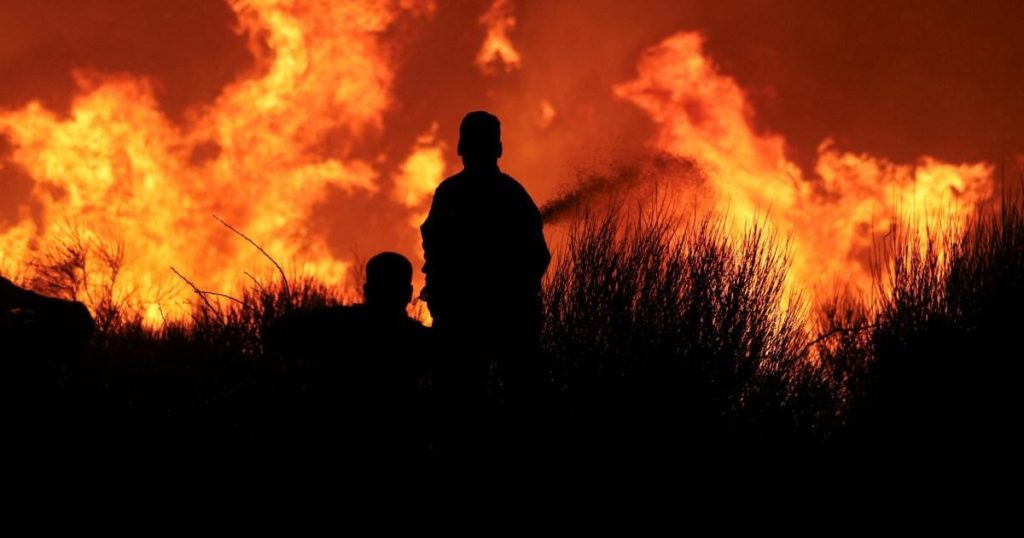Fires have continued to ravage Europe for more than a month, devastating thousands and thousands of hectares.
Extreme heat has hit the Mediterranean and the Balkans, where temperatures have long exceeded the 40°C mark.
Families are heading towards Spain were warned to prepare for the weather report and drought, which forced authorities to issue some usage restrictions of water.
Large swathes of southern Europe are also being evacuated due to wildfires, with the latest incidents occurring in the region. Greek capital of Athens, which have been described as a “biblical catastrophe”.
While such fires are common in summer, extraordinarily hot and dry weather linked to climate change has made them more frequent and intense.
Here's everything you need to know about the weather and how it impacts your travels.
Greece
A fast-spreading wildfire, fueled by strong winds, was moving closer to central Athens on Monday.
Plumes of smoke darkened the sky over the capital as the fire approached the residential suburb of Dionysus.
More than 560 firefighters supported by volunteers, 17 water bombers and 15 helicopters battled the fire which broke out at 3pm on Sunday near Varnavas, about 30 kilometres north of the town.
At least 11 towns and villages were evacuated, along with three hospitals, as flames reaching up to 25 metres (82 feet) high ravaged homes, cars and forests.
Marathon Mayor Stergios Tsirkas told Greek television channel Skai that the town was facing a “biblical catastrophe”, adding: “It is engulfed in flames and going through difficult times.”
The fire is raging on several fronts, including in the village of Grammatiko, the town of Marathon, the seaside municipality of Nea Makri and Mount Penteli.
Strong winds constantly change the direction of the flames, which spread “like lightning.”
“Despite a fierce battle and superhuman efforts during the night, the fire spread very quickly and reached Mount Penteli,” a fire official said.
Prime Minister Kyriakos Mitsotakis rushed back to Athens after a weekend on the island of Crete to oversee the response to the fire.
After the warmest winter on record and long periods of low rainfall, Greece is set to record its hottest summer on record.
Authorities will remain on high alert against fires until Thursday.
Portugal
A fire is raging in northeastern Portugal, destroying around 42 kilometres of land in the protected Montesinho Natural Park.
Flames were seen rising from the southern slopes just before midnight Sunday, painting the night sky red and orange.
At least 9,000 people live in the dozens of villages scattered around the park, but it is not known whether any of them have been forced to abandon their homes because of the fires.
Dozens of firefighters and volunteers were mobilized to fight the flames, exacerbated by strong winds.
Spain
A heat warning remains in force across Spain, with temperatures expected to reach 37C on Monday.
The heat wave, combined with a lack of rainfall, has forced authorities in some parts of the country to announce some restrictions on water use.
Citizens were urged to “use it responsibly”, while filling swimming pools was banned.
The affected towns are Toras, El Toro and Barracas, in the province of Castellón.
Bulgaria
Bulgaria has become the EU member state most seriously affected by forest fires in 2024.
According to the European Forest Fire Information System, some 38,000 hectares of land have been burned so far, more than double the area affected in 2023.
Firefighters from Greece, France, the Czech Republic, Sweden and Spain have been deployed to help manage the crisis.
What to drink in case of heatwave?
It is a well-known advice to drink plenty of fluids to avoid dehydration.
But before you reach for your water bottle, one doctor says there's a better option for dealing with a heat wave: milk.
It's not a summer custom; we all remember Anchorman's Ron Burgundy proclaiming that “milk was a bad choice” under the sweltering sun, right?
However, Dr. Natasha Fernando, medical director of Medical checksclaims it “may be more hydrating than water.” Find out why that’s the case here.
Contact our press team by emailing us at webnews@metro.co.uk.
For more stories like this, Check out our news page.
MORE : Deadly 'sloth fever' spreads across Europe at 'unstoppable' pace, killing two
MORE : Experts answer all your questions about sunscreen, including whether you can tan with SPF
MORE : School engulfed in wildfire raging through Athens
Get breaking news, heartwarming stories, analysis and more
This site is protected by reCAPTCHA and the Google Privacy Policy Privacy Policy And Terms of Use apply.








